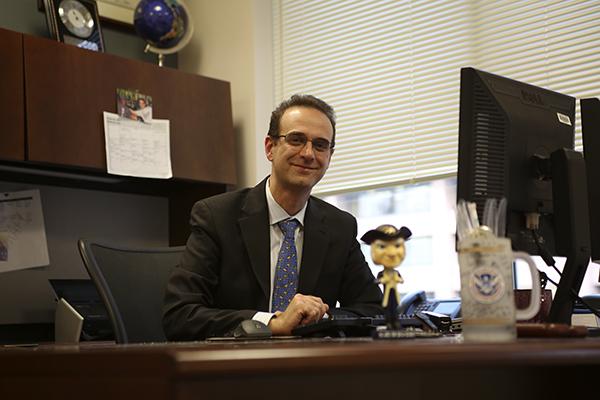The 1998 Student Association president wants to mobilize his graduating class after officials removed the telephone booth the Class of 1998 donated to the University.
Kuyomars “Q” Golparvar, who graduated in 1998 with a bachelor’s degree in international affairs and Middle East studies, led a campaign his senior year to raise money for a London-style phone booth that sat on the corner of G and 21st streets for more than 15 years. After officials removed the phone booth this summer, Golparvar said he will rally his class once more to establish another permanent representation on campus.
“I feel like the Class of ‘98 made history back in ‘98, and maybe this is an opportunity to re-engage prior classes including my classes and say, ‘Hey, maybe let’s raise money again and bring back our senior class gift,’” he said.
Officials removed and recycled two phone booths this summer, one at G and 22nd streets and one near Tonic at G and 21st streets, which were donated by the classes of 1998 and 1999. Citing the challenges of maintaining them, University spokesman Brett Zongker said the booths were also “no longer consistent with the campus aesthetic.”
Zongker said officials will replace the phone booths, which cost about $3,000 each, with two benches that will be placed in University Yard. He said University officials have not decided when the benches will be placed.
Members of the 1998 and 1999 graduating classes were not notified that their gifts would be removed from campus. Zongker said the University apologizes for not letting the alumni know that their donations would be taken away.
“We recognize that we could have done a better job of communicating this decision to representatives of the classes involved, and we offer a sincere apology to the members of these classes,” he said. “We are working closely with representatives from these classes to ensure the changes are communicated more broadly to the members of the class and the GW community.”
When Golparvar was walking on campus last month, he noticed the phone booth’s absence. From there, he contacted University officials, like Alumni Association President Jeremy Gosbee and Vice President for Development and Alumni Relations Aristide Collins, to see why the booths were taken out.
Golparvar, who is an adjunct faculty member at GW Law School, said he wants to turn the phone booths’ removal into another fundraising opportunity with the Class of 1998. He said he’d like to collect donations from the class to bring another phone booth back on campus, possibly with features like a charging station for cell phones on the inside.
“I oftentimes see tourists and students take pictures in front of the phone booth as they’re going to Tonic or leaving Tonic. So you could tell that it was something that did stand out to folks, and something that did make our campus unique,” Golparvar said.
Golparvar, who also works as an attorney for the federal government, said he wanted the senior class to raise money for a phone booth in 1998 because it was “unique” and would draw attention to his graduating class’ fundraising efforts.
“I have always been a big GW fan, and I’ve always had a lot of school spirit, even many years later,” he said, wearing a GW necktie. “One of the things I was really interested in was to try to see how our class could leave our mark on campus and to work with the University to be able to do that.”
Andrea Lee, a 2000 alumna, wrote a letter about the phone booth’s removal that she posted to the University’s Facebook page, which received more than 300 likes. She said the classes’ phone booths did not have to be on campus “for perpetuity,” but officials should have communicated with their alumni about the removal.
“They have sent me letters at least four times a year, probably more [for donations],” she said. “And those letters have followed me to all the different homes I’ve lived in two different states. They clearly know how to find me. They could’ve used one of those communication opportunities.”
Eventually, senior classes continued to raise money for the University, but did not purchase tangible gifts with the donations. The University’s Senior Class Gift campaign now allows students to choose which area of campus they want their donation to go – like their student organization or financial aid. Last year, seniors raised $128,000 for the University. This year, the campaign is looking to get at least 62 percent of seniors to give back.
Juman Kekhia, the lead coordinator of this year’s Senior Class Gift campaign, said the University’s fundraising from seniors is forward-looking and is “about making a difference for current and future students through philanthropy.”
“Participating in the campaign today is about making a difference through giving to an area of the University that is meaningful to each individual senior,” she said. “Through this effort, we recognize that the students and alumni who came before us impacted our experience through their philanthropy, and we want to carry on that tradition for future students.”








